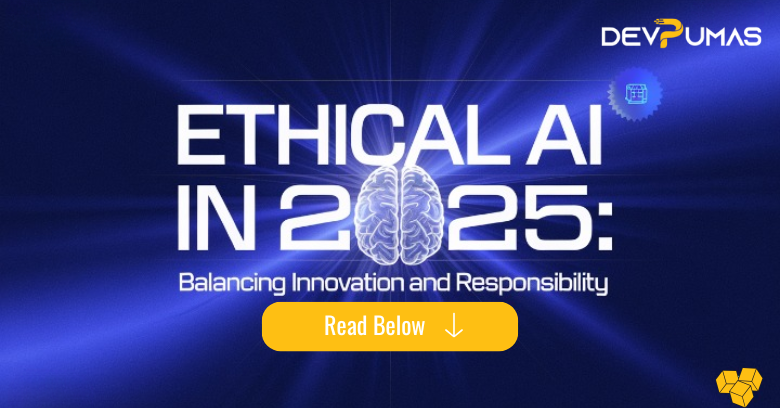Introduction: The Promise and Challenges of Ethical AI in 2025
Artificial intelligence (AI) is no longer a futuristic concept; it is an integral part of daily life, powering applications from healthcare to autonomous vehicles. As AI becomes increasingly pervasive, addressing ethical concerns becomes paramount. The rapid evolution of ethical AI in 2025 raises critical questions: How can we ensure AI systems are fair, transparent, and accountable? How do we prevent bias, protect privacy, and avoid misuse?
This article examines the ethical challenges posed by advanced AI systems in 2025 and explores strategies to balance innovation with responsibility. From data privacy and algorithmic bias to the societal impact of automation, the role of ethical AI in 2025 cannot be overstated.
1. Defining Ethical AI
Ethical AI refers to designing, developing, and deploying artificial intelligence systems that align with societal values and ethical principles. In 2025, this involves addressing issues such as:
- Fairness: Ensuring algorithms do not discriminate against specific groups.
- Transparency: Making AI decision-making processes understandable to users.
- Accountability: Establishing clear responsibility for AI outcomes.
As AI continues to influence critical areas like finance, healthcare, and governance, adhering to ethical standards becomes a non-negotiable requirement.
2. Key Ethical Challenges in AI
2.1 Algorithmic Bias
Bias in AI algorithms occurs when models produce unfair outcomes due to skewed training data or flawed assumptions. This can lead to:
- Discrimination in hiring systems.
- Inequitable lending decisions.
- Misidentification in facial recognition technology.
Real-World Example:
In 2020, several facial recognition systems were found to have higher error rates for darker-skinned individuals, highlighting the importance of addressing bias in AI.
2.2 Privacy Concerns
With AI systems processing vast amounts of personal data, privacy concerns have become a top priority in ethical AI in 2025. Issues include:
- Data breaches.
- Surveillance without consent.
- Lack of transparency in data collection practices.
2.3 Misuse of AI
AI technologies, such as deepfakes and autonomous weapons, present significant ethical challenges. Without proper regulations, these tools can be exploited for harmful purposes, including spreading misinformation and cyberattacks.
3. Solutions for Ethical AI in 2025
3.1 Bias Mitigation
Addressing algorithmic bias requires a combination of technical and organizational strategies:
- Diverse Training Data: Use datasets that reflect demographic diversity to minimize bias.
- Bias Audits: Regularly assess AI systems for potential discriminatory outcomes.
- Inclusive Design Teams: Involve diverse perspectives during development.
3.2 Privacy-Centric AI Design
Privacy-focused AI ensures user data is handled responsibly:
- Data Anonymization: Remove personally identifiable information from datasets.
- Federated Learning: Train AI models locally on user devices rather than centralized servers.
- Regulatory Compliance: Adhere to data protection laws like GDPR and CCPA.
3.3 Governance and Accountability
Strong governance frameworks are essential for ensuring ethical AI practices:
- Ethical Review Boards: Establish committees to oversee AI projects.
- Explainability Tools: Develop tools that make AI decisions transparent and understandable.
- Liability Standards: Define who is responsible for AI failures.
4. The Role of Regulations in Ethical AI
In 2025, governments and organizations play a critical role in defining ethical standards for AI. Key initiatives include:
4.1 International Agreements
Global cooperation is necessary to create uniform AI standards. The EU’s AI Act, for instance, serves as a blueprint for regulating high-risk AI applications.
4.2 Industry Guidelines
Tech companies are implementing voluntary ethical guidelines to address public concerns. For example, Microsoft’s AI principles emphasize fairness, privacy, and accountability.
4.3 AI Ethics Committees
Organizations are forming internal ethics committees to review AI projects, ensuring they align with ethical principles before deployment.
5. The Societal Impact of Ethical AI
Ethical AI affects more than just technical outcomes; it has profound societal implications.
5.1 Workforce Automation
As automation continues to replace human jobs, ethical AI must consider:
- Job Displacement: Support reskilling initiatives for affected workers.
- Fair Distribution of Benefits: Ensure automation benefits society as a whole.
5.2 Accessibility
Ethical AI must prioritize inclusivity, ensuring its benefits are accessible to all, including underrepresented communities and individuals with disabilities.
5.3 Trust in Technology
Transparent and accountable AI systems build public trust, fostering greater adoption of AI technologies.
6. Emerging Trends in Ethical AI
6.1 AI Explainability
By 2025, explainability tools are becoming mainstream, helping users understand how AI makes decisions. This is especially crucial in high-stakes fields like healthcare and finance.
6.2 Decentralized AI
Decentralized AI models that operate locally on user devices (e.g., edge AI) enhance privacy while reducing reliance on centralized data processing.
6.3 Sustainability
AI systems are being optimized for energy efficiency, addressing environmental concerns associated with large-scale AI deployments.
7. Famous Organizations and Tools Driving Ethical AI
Several organizations and tools are shaping the development of ethical AI in 2025:
- OpenAI: Committed to creating safe and beneficial AI.
- IBM Watson OpenScale: A platform that monitors AI performance for fairness and accuracy.
- Google’s AI Principles: Focused on avoiding bias and prioritizing accountability.
8. How Businesses Can Embrace Ethical AI
8.1 Training and Awareness
Educate employees about ethical AI practices through workshops and certifications.
8.2 Integrate Ethics into Development
Embed ethical principles into every stage of AI development, from ideation to deployment.
8.3 Monitor and Adapt
Continuously evaluate AI systems to ensure they align with evolving ethical standards.
Wrapping It Up: Ethical AI as the Foundation of the Future
As artificial intelligence becomes increasingly integrated into society, the importance of ethical AI in 2025 cannot be overstated. Balancing innovation with responsibility is not just an ethical imperative—it’s a necessity for building trust, driving adoption, and ensuring that AI serves the greater good.
By addressing challenges like bias, privacy, and misuse, and adopting robust governance frameworks, businesses and governments can create a future where AI enhances human potential while upholding societal values. The journey toward ethical AI is ongoing, but with the right strategies, the future looks promising.



